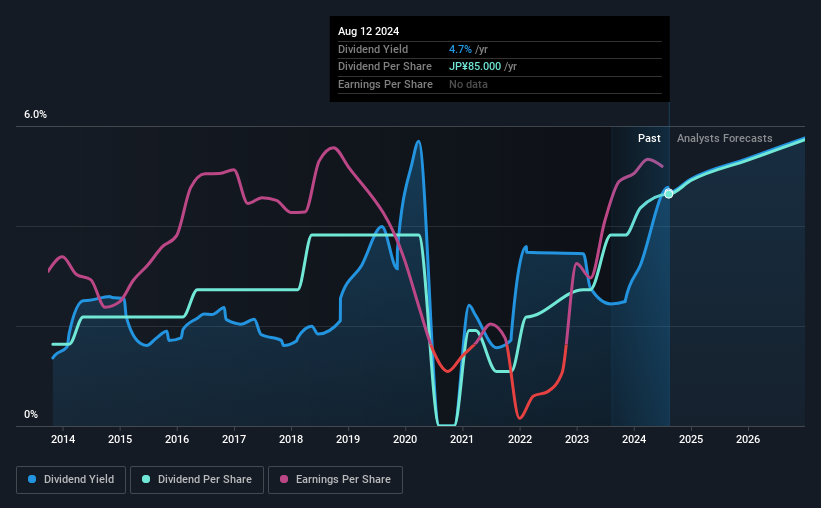
Ryobi Limited (TSE:5851) will pay a dividend of ¥42.50 on the 28th of March. This means the annual payment is 4.7% of the current stock price, which is above the average for the industry.
While the dividend yield is important for income investors, it is also important to consider any large share price moves, as this will generally outweigh any gains from distributions. Ryobi's stock price has reduced by 33% in the last 3 months, which is not ideal for investors and can explain a sharp increase in the dividend yield.
View our latest analysis for Ryobi
Ryobi's Earnings Easily Cover The Distributions
A big dividend yield for a few years doesn't mean much if it can't be sustained. Before making this announcement, Ryobi was easily earning enough to cover the dividend. This means that most of its earnings are being retained to grow the business.
Looking forward, earnings per share is forecast to rise by 5.8% over the next year. If the dividend continues on this path, the payout ratio could be 25% by next year, which we think can be pretty sustainable going forward.

Dividend Volatility
Although the company has a long dividend history, it has been cut at least once in the last 10 years. The annual payment during the last 10 years was ¥30.00 in 2014, and the most recent fiscal year payment was ¥85.00. This implies that the company grew its distributions at a yearly rate of about 11% over that duration. It is great to see strong growth in the dividend payments, but cuts are concerning as it may indicate the payout policy is too ambitious.
The Dividend Looks Likely To Grow
Given that the dividend has been cut in the past, we need to check if earnings are growing and if that might lead to stronger dividends in the future. Ryobi has impressed us by growing EPS at 17% per year over the past five years. A low payout ratio and decent growth suggests that the company is reinvesting well, and it also has plenty of room to increase the dividend over time.
We Really Like Ryobi's Dividend
It is generally not great to see the dividend being cut, but we don't think this should happen much if at all in the future given that Ryobi has the makings of a solid income stock moving forward. By reducing the dividend, pressure will be taken off the balance sheet, which could help the dividend to be consistent in the future. All of these factors considered, we think this has solid potential as a dividend stock.
Companies possessing a stable dividend policy will likely enjoy greater investor interest than those suffering from a more inconsistent approach. Meanwhile, despite the importance of dividend payments, they are not the only factors our readers should know when assessing a company. For example, we've picked out 1 warning sign for Ryobi that investors should know about before committing capital to this stock. If you are a dividend investor, you might also want to look at our curated list of high yield dividend stocks.
New: AI Stock Screener & Alerts
Our new AI Stock Screener scans the market every day to uncover opportunities.
• Dividend Powerhouses (3%+ Yield)
• Undervalued Small Caps with Insider Buying
• High growth Tech and AI Companies
Or build your own from over 50 metrics.
Have feedback on this article? Concerned about the content? Get in touch with us directly. Alternatively, email editorial-team (at) simplywallst.com.
This article by Simply Wall St is general in nature. We provide commentary based on historical data and analyst forecasts only using an unbiased methodology and our articles are not intended to be financial advice. It does not constitute a recommendation to buy or sell any stock, and does not take account of your objectives, or your financial situation. We aim to bring you long-term focused analysis driven by fundamental data. Note that our analysis may not factor in the latest price-sensitive company announcements or qualitative material. Simply Wall St has no position in any stocks mentioned.
About TSE:5851
Ryobi
Operates as a die casting manufacturer in Japan, the United States, China, and internationally.
Flawless balance sheet, undervalued and pays a dividend.
Similar Companies
Market Insights
Community Narratives


